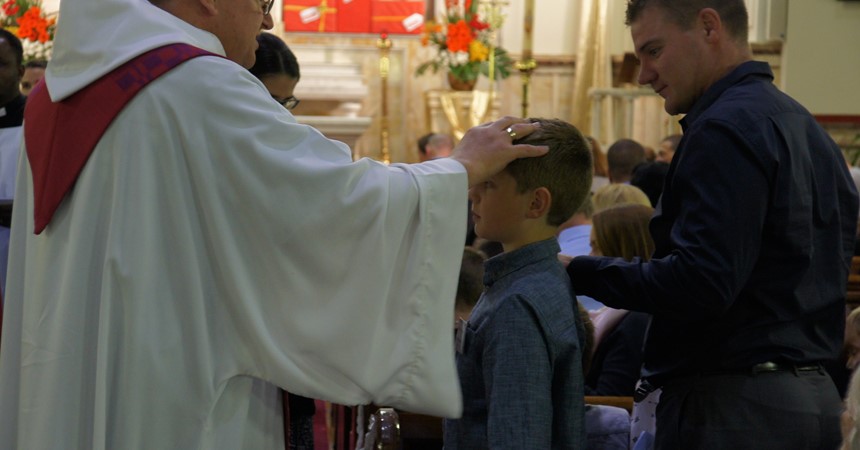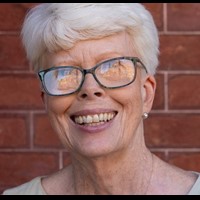A month ago, Fiona Duque and I provided you with a Christian Initiation Update. Confirmation is the second step for children on the journey of Christian Initiation. To say ‘yes’ to being confirmed is a big step, not only for the child, but also for the family and for the whole parish community.
Every year, messages about confirmation are included in parish bulletins and perhaps school newsletters. Together with the presence of young children and their families in our parish community, it is a wakeup call inviting me personally, and us together, to reflect on how I am/we are living our confirmation every day. How does the fact that I am confirmed in Christ shape my life, change me as a person, empower me for life and mission? How are we as members of our parish communities modelling discipleship for these children and their families?
I recently read the following post on confirmation which I thought I would share in case it moves you as it moved me. I recently discovered the writing of Erik Varden, Bishop of Trondheim. His website is here. In the following post he is speaking to confirmation candidates in his Norwegian context. He is speaking to an older cohort than we have for confirmation but primarily I hear him speaking to me.
I invite you to read it and to let his words echo in your heart and mind. How are you invited to reflect on how you live your confirmation daily?
CONFIRMATION 22 April 2023
Acts 6.1-7: The word of God continued to spread.
John 6.16-21: This frightened them. He said, It is I.
Dear confirmation candidates,
Wednesday this week was Yom haShoah, the global day of remembrance of the Holocaust. In our country there are now just a small handful of eye witnesses left. We risk forgetting. When I grew up in the 80s, the War didn’t seem all that remote. One still spoke of ‘the War’ as if there were only one, the Second World War. Much has happened since then. We have seen many catastrophes. ‘The War’ is now one among many; it can seem remote. Yet it has left deep marks, also very near us.
Nazi antisemitism struck even here in Ålesund. Whoever goes into town, to Rasmus Rønnebergsgate 18, just behind the hotel, will find four small brass squares embedded in the pavement with the names of Israel, Lea, Reidun and Morten Steinfeld. Israel was part of the council of the athletes’ association; Lea was active in charity. Their children, Reidun and Morten, were integrated members of the town’s youth group. In 1942 and 43 the family —first Israel, then the others — were arrested, deported, and sent to Auschwitz, where they were killed.
Friends warned Israel to flee abroad. He answered: ‘I am a Norwegian citizen. I have done nothing wrong. I have nothing to fear.’ He was wrong.
On Wednesday I read something Chief Rabbi Jonathan Sacks said on a visit to Auschwitz a few years ago:
Walking through Auschwitz, what strikes you today is how careful the Nazis were to waste nothing. They took everything, kept everything, and not only items of value. Here you see mountains of suitcases, piles of toothbrushes, and shoes, hundreds of thousands of shoes, worn, battered, but still collected. Nothing was too valueless to throw away, except life. A million shoes saved, a million lives destroyed.
I doubt whether anyone would even have looked Israel, Lea, Reidun and Morten Steinfeld in the eye in Auschwitz before they were undressed, shaved, and sent to the gas chambers; but their shoes, probably purchased in a shoe shop here in Ålesund, will still be somewhere in the pile.
Dear confirmation candidates, this is a joyful day for you and your families. Why, then, am I standing here talking about one of the cruellest chapters of human history? I do it because the sacrament you are about to receive is no private matter, no pious formality. The sacrament equips you to embrace an urgent task: to participate in healing a world that is sick. Or to say it somewhat differently: to participate in the saving work of Jesus Christ.
In a moment I shall read a wonderful blessing over you: ‘Lord, send these your children the spirit of wisdom and understanding, the spirit of right judgment and courage, the spirit of knowledge and reverence. Fill them with the spirit of wonder and awe in your presence.’ When the disciples received the Holy Spirit at Pentecost, they perceived the Spirit as fire. To draw close to God is not without risk. One does not play with fire. But to draw close to God is simultaneously wonderful. An enlightening flame is kindled in our heart. We see how grandiose life is. We see that the longing which animates us – the longing for love, to become and to do something beautiful – is no impossible longing, but one that points towards a reality whose source is in God, which we are called to realise in our lives.
The Spirit with which you are anointed is the Creator Spirit. It renews all things. Once we are conscious of the Spirit’s presence in ourselves, we can see it in others. Then we see the dignity of human nature and at the same time human nature’s fragility. This realisation entails responsibility. It touches our lives concretely, pointing towards choices we must make, choices on which much depends. Let me return to the Chief Rabbi for a moment.
He asked how, face to face with this world’s cruelty, we may believe in a loving, almighty God? Where was God in Auschwitz? Where is he in the crises of our time, in Ukraine, Yemen, Syria, Congo? This question points towards something essential, but Sacks points out (rightly) that it is a question posed, Biblically speaking, on mistaken terms. The real question is not, ‘Where was God in Auschwitz?’, but: Where was man?
God never said He’d stop us harming one another, but He did give us a moral code, commandments engraved in stone which taught us how to stop ourselves. Where was humanity when old men and women were being murdered, millions being gassed, children thrown on the flames still alive? The real question, so painful we can hardly ask it, is not where was God when we called to Him, but where were we when He called to us? I don’t understand what it was to live here, I don’t understand what it was to die here, I don’t understand what it was to issue the orders, carry them out, decide who would live and who would die. But I think I understand one thing, that this is what the Bible warned against in its very first chapter when God said, “Let us make man in our own image, after our own likeness.” When human life is no longer sacred, Auschwitz becomes possible.
Dear candidates for confirmation, today God calls on you. Today you answer, Yes! You use your freedom to be sealed with the Holy Spirit. You declare yourselves bearers of a life that exceeds you. You confess that there is something sacred about [human beings]. Let that consciousness shape your lives, your choices.
We leave in a peaceful land, thank God. But as Israel Steinfeld and his family learnt: not even Norwegian legislation is a sure defence against hatred, malice, and lies. Our world needs courageous young people who stand up for what is good, just, and true. May you, anointed with the Spirit of wisdom and understanding, right judgment and courage be such people. Amen.
What are the circumstances in our personal and communal context where we are being invited and challenged to live our confirmation? Where is the spirit of God’s wisdom and understanding, God’s right judgement and courage, God’s knowledge and reverence, God’s wonder and awe needed in our towns and neighbourhoods?
To be confirmed and anointed in Christ is an enormous privilege and responsibility. It is no wonder the Church’s rites of Christian Initiation – of baptism, confirmation and the celebration of first communion – state unequivocally that this ministry belongs to the whole parish. It needs all of us to be involved, to share our stories and to show up for the celebration of the sacrament, if our young candidates and their families are to see that it is possible to live our confirmation daily, right here and right now.
The season of confirmation has begun. It needs all of us to be involved. Why not offer to help in your parish?
Erik Varden is a monk and bishop, born in Norway in 1974. In 2002, after ten years at the University of Cambridge, he joined Mount Saint Bernard Abbey in Charnwood Forest. Pope Francis named him bishop of Trondheim in 2019.
You can subscribe to his newsletter here. Scroll to the bottom of the page. He has written two powerful books on Christian life and liturgy:
The Shattering of Loneliness: On Christian remembrance
Entering the twofold mystery: On Christian conversion
Acknowledgements
Image: © 2022 Diocese of Maitland-Newcastle. All rights reserved.
Follow mnnews.today on Facebook.

